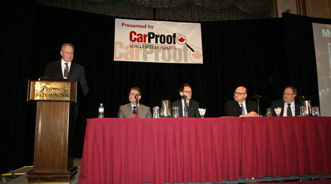CPO Panelists Explore Certified Opportunities

By subscribing, you agree to receive communications from Auto Remarketing and our partners in accordance with our Privacy Policy. We may share your information with select partners and sponsors who may contact you about their products and services. You may unsubscribe at any time.
TORONTO –
It can help your dealership stand apart from its peers. It can help expand the customer base. It can help knock down departmental walls. But it also requires a certain disciplined strategy to succeed.
This was part of the message expressed about the certified pre-owned market at this week’s Auto Remarketing Canada conference presented by CarProof.
Canadian CPO executives and top certified dealers were on hand not only as attendees at the event, but also to share their insight on trends they have spotted in the CPO market what makes them successful at selling certified.
The workshop titled “The Certified Pre-Owned Advantage and Important Dealer and OEM Advertising Strategies” included Honda Canada’s national manager of used-vehicle operations Todd Fowler; London Honda dealer principal Peter Johnson; Toyota Canada certified used vehicle specialist Luc Grenier; and Jeff Polo, sales manager at Destination Toyota of Burnaby.
Moderating the panel was Joe Lescota, the automotive department chairman at Northwood University who is stepping down from that post and moving on to serve as the director of dealer development for the National Independent Automobile Dealers Association on June 1.
“CPO gives us a differentiating strategy,” said Johnson, in response to a question about the connection between CPO and an efficient marketplace.
Subscribe to Auto Remarketing to stay informed and stay ahead.
By subscribing, you agree to receive communications from Auto Remarketing and our partners in accordance with our Privacy Policy. We may share your information with select partners and sponsors who may contact you about their products and services. You may unsubscribe at any time.
“For us, it’s about trying to grow the customer base (of both new and used shoppers),” Fowler chimed in. “Our certified brands help us achieve that.”
In response to a question later on in the discussion, Fowler also stressed the greater likelihood of a customer coming back for service at the dealership where the car was purchased if he or she buys CPO versus if the shopper buys a non-certified used car.
In a separate on-site discussion with Auto Remarketing Canada, that sentiment was echoed by Ryan Robinson, director of the Canadian Automotive Practice at J.D. Power and Associates.
J.D. Power has found that if someone buys a certified vehicle, he or she is “much more likely” to turn to that dealership for their service needs. The trusting buyer-seller relationship that CPO is designed to foster can extend into the service side as well.
“If part of why you CPO vehicles in the first place is to engender the kind of trust in the seller-buyer relationship, that’s going to extend into whether or not they’re going to give you their servicing business down the road,” Robinson said.
What’s more, J.D. Power found that the CPO market can serve as a way to knock down the departmental barriers that often exist at a dealership, “particularly between the sales and service” units, he added.
“Traditionally, there are these walls that get erected between the different business units within the dealership, and what we’re saying is that there’s profit and revenue potential than can be unlocked if we start to break down those barriers between the different business units that dealers operate,” Robinson said.
But as the panelists pointed out, selling CPO requires an all-in approach
During their discussion, one important reminder that came up was the notion that CPO is not a bargaining chip to be negotiated on or off the table with buyers. The panelists emphasized that the vehicle must be certified up front.
“You sell it right up front,” Polo stressed.
And as Grenier added, “It’s not an option on the car — it’s THE car.”


